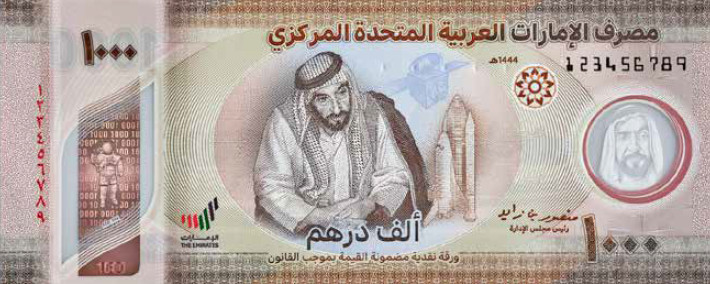The United Arab Emirates honors the visionary behind the country’s ambitious space program
In 2020, a few months into the COVID-19 pandemic, the United Arab Emirates’ space agency launched its first mission to Mars—an accomplishment depicted on the UAE’s 1,000 dirham note. The spacecraft, called “Hope,” was the first from an Arab nation to reach the red planet and is currently in orbit for one Martian year—the equivalent of 687 days on Earth—providing scientists a complete picture of the Martian atmosphere.
UAE's third 1,000 dirham note issue
The country is the fifth to reach Mars, and only the second in the world (after India) to successfully launch a probe into orbit on the first attempt, just six years after forming a space agency. Omran Sharaf, the Mars mission project manager, explained the country’s motivation in a 2019 TEDx Talk. “The oil age will not end because we run out of oil,” he said, “it will end because of progress...It’s about survival.”
The UAE’s goal, ultimately, is to be the first country to build a sustainable colony on the red planet in the next 100 years—a vision inspired by the UAE’s founding father, the late Sheikh Zayed bin Sultan Al Nahyan. Sheikh Zayed had ambitions of making the country a hub for space research and innovation and invested heavily in the sciences. Throughout the 1970s, he met with astronauts from several of the Apollo missions and was even gifted a sliver of moon rock by US President Richard Nixon.
The latest issue of the 1,000 dirham note depicts Sheikh Zayed looking at the UAE’s Hope space shuttle and has a portrait of an astronaut in the security foil on the front and back. The note was recently named “Best New Banknote” at the industry’s High Security Printing EMEA Conference for its design and advanced security features; it went into circulation in December 2022, in the same month the UAE again made history by launching the Arab world's first lunar rover.
The space program’s success sends a message to the region’s youth—a goal held by Sheikh Zayed, who wanted his love of science instilled in young people. About 90 percent of the Emirati Mars team is younger than 35, and a third are women. “If the UAE is able to reach Mars in less than 50 years,” Sharaf said, “you [the youth] can do much more.”
Opinions expressed in articles and other materials are those of the authors; they do not necessarily reflect IMF policy.










